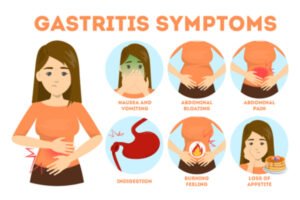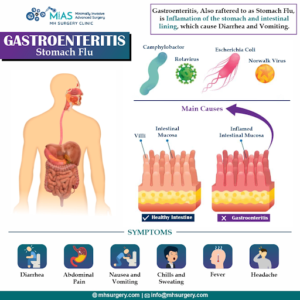Gastroenteritis, commonly known as the stomach flu or gastric flu, is a prevalent condition characterized by inflammation of the stomach and intestines. While it is often a short-term illness, the symptoms can be uncomfortable and disruptive. Recognizing the key signs of gastroenteritis is crucial for prompt treatment and relief. Let’s explore these symptoms in detail and learn how to manage them effectively.
Understanding Gastroenteritis:
Gastroenteritis is typically caused by viral or bacterial infections, although it can also result from parasites or contaminated food and water. The condition leads to irritation and inflammation of the gastrointestinal tract, resulting in symptoms such as nausea, vomiting, diarrhea, abdominal pain, and sometimes fever.
Key Signs and Symptoms:
- Nausea and Vomiting: Nausea, often accompanied by a sensation of queasiness or an upset stomach, is a hallmark symptom of gastroenteritis. Vomiting may occur intermittently, contributing to dehydration and electrolyte imbalance.
- Diarrhea: Diarrhea is another prevalent symptom of gastroenteritis, characterized by loose or watery stools. In some cases, diarrhea may be severe and frequent, leading to dehydration and weakness.
- Abdominal Pain and Cramping: Abdominal pain and cramping are common features of gastroenteritis, typically occurring in the lower abdomen. These sensations may range from mild discomfort to severe cramps, contributing to overall discomfort.
- Fever and Chills: In some cases, gastroenteritis may be accompanied by fever and chills, indicating an inflammatory response to the underlying infection. Fever is often low-grade but can occasionally spike in more severe cases.
- Dehydration: Dehydration is a significant concern in gastroenteritis, particularly if vomiting and diarrhea persist. Signs of dehydration include dry mouth, decreased urine output, dark-colored urine, dizziness, and weakness.
Management and Treatment:
- Hydration: The cornerstone of gastroenteritis management is hydration. Drinking plenty of fluids, including water, oral rehydration solutions, clear broths, and electrolyte-rich beverages, helps replace lost fluids and electrolytes.
- Rest and Nutrition: Rest is essential to allow the body to recover from gastroenteritis. While symptoms persist, opt for bland, easily digestible foods such as rice, bananas, applesauce, and toast (BRAT diet) to minimize gastrointestinal irritation.
- Medications: Over-the-counter medications such as antiemetics (for nausea and vomiting) and antidiarrheals may provide symptomatic relief in some cases. However, use these medications cautiously and consult a healthcare professional if symptoms persist or worsen.
- Seeking Medical Attention: While most cases of gastroenteritis resolve on their own within a few days, seek medical attention if symptoms are severe, persistent, or accompanied by signs of dehydration (e.g., decreased urine output, dizziness). Young children, older adults, and individuals with weakened immune systems may be at higher risk of complications and should seek prompt medical care.
Prevention Strategies:
- Hand Hygiene: Practicing good hand hygiene, including frequent handwashing with soap and water, can help prevent the spread of gastroenteritis-causing viruses and bacteria.
- Food Safety: Ensure proper food handling, storage, and preparation to minimize the risk of foodborne illnesses. Thoroughly cook meats, wash fruits and vegetables, and avoid consuming undercooked or contaminated foods.
- Stay Home When Sick: If you are experiencing symptoms of gastroenteritis, including nausea, vomiting, diarrhea, or fever, it is essential to stay home from work, school, or social activities to prevent spreading the illness to others.
Gastroenteritis Symptoms

The characteristic manifestations of gastroenteritis encompass:
- Emesis and emetic reflex
- A gastrointestinal disorder characterized by frequent and loose bowel movements.
- Abdominal cramps
- Pyrexia Lethargy
Managing Bacterial Gastroenteritis

Bacterial gastroenteritis poses distinct difficulties because of the wide range of bacterial infections involved. Frequently, the leading causes of bacterial infections are contaminated food, water, or incorrect food management techniques. The symptoms of bacterial gastroenteritis can vary in intensity, ranging from mild to severe. In some instances, medical intervention may be necessary to address problems such as dehydration and electrolyte imbalances.
Medical assessment and therapy

Gastroenteritis Diagnosis
A physical examination, a review of symptoms, and occasionally laboratory testing to determine the causing agent are all part of the diagnosis process for gastroenteritis. Stool samples can be examined to ascertain the existence of bacteria or viruses.
Possible courses of treatment
The treatment primarily centres around symptom management and the prevention of dehydration.
This could encompass:
- Fluid replacement therapy
- Pharmaceuticals used to manage and suppress the act of vomiting
- Medications used to treat diarrhoea
- Recovery and sufficient nourishment
Natural remedies for common ailments
Various domestic remedies might assist in mitigating symptoms and facilitating healing, including:
- Consuming transparent fluids such as water, broth, or electrolyte solutions
- Consuming tasteless items such as crackers, rice, and bananas
- Ensuring sufficient sleep Abstaining from hot or greasy foods
Analyzing Non-infectious Gastroenteritis
Apart from infectious causes, non-communicable variables like drug or substance consumption can also lead to gastroenteritis. Toxic gastroenteritis can develop after consuming chemicals, heavy metals, or specific drugs that irritate the lining of the gastrointestinal tract. This irritation leads to inflammation and symptoms similar to those of infectious gastroenteritis.
Strategies for prevention
Immunization
Immunization against specific viruses, such as rotavirus, can decrease the likelihood of gastroenteritis, particularly in youngsters.
Hand hygiene
Regularly washing your hands with soap and water, particularly after using the toilet and before touching food, can effectively reduce the transmission of gastroenteritis.
Measures to ensure the safety of food
Adhering to correct food handling and preparation methods, ensuring meats are cooked thoroughly, and preventing cross-contamination can reduce the likelihood of contracting foodborne gastroenteritis.
Guidelines for Managing Diet in Gastroenteritis
Dietary changes are essential to controlling the symptoms of gastroenteritis and encouraging gastrointestinal healing. The BRAT diet, consisting of easily digestible meals such as plain rice, bananas, applesauce, and toast, is commonly suggested during acute bouts to ease symptoms and supply necessary nutrients without worsening gastrointestinal distress.
When should one pursue medical assistance?
Although the majority of gastroenteritis cases recover spontaneously within a few days, specific indications may suggest problems that necessitate medical intervention.
The following items are included:
- Chronic vomiting or diarrhoea resulting in excessive loss of fluids from the body
- Elevated body temperature
- Hematochezia
- Indicators of shock, such as syncope or tachycardia
In conclusion, recognizing the key signs of gastroenteritis is essential for timely intervention and management. By understanding the symptoms and adopting preventive measures, you can minimize the impact of gastroenteritis and promote a speedy recovery. If you or a loved one experience severe or persistent symptoms, don’t hesitate to seek medical attention for appropriate evaluation and treatment.

